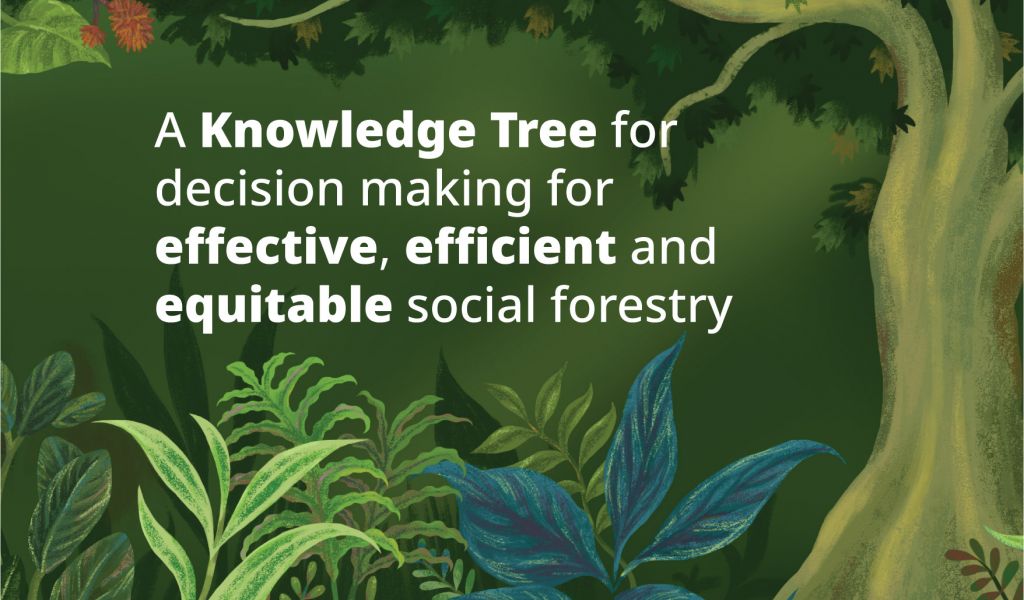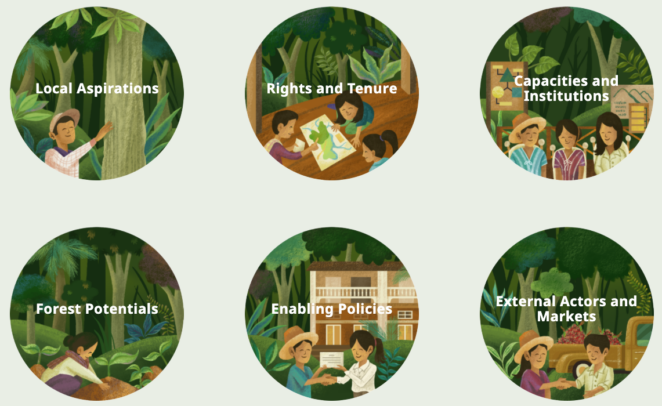A Knowledge Tree for decision making for effective, efficient and equitable social forestry

Introduction
Local communities use and manage forests throughout the world for subsistence, trade and cultural purposes. In Southeast Asia, close to 140 million people generate livelihoods from forests.
Forest management practices have evolved over time to meet the changing needs of local people, the markets for forest products and a range of political interests. Social forestry offers an alternative form of forest management. It is an approach that balances the needs of local people with multiple external interests.
The Knowledge Tree is an online platform allowing practitioners to easily navigate a rich source of knowledge about social forestry practices in Southeast Asia based on the context, interests and needs. It provides ideas, concepts, evidence and tools to help users to better understand the context in which social forestry operates, and to tailor effective, efficient and equitable (3E) social forestry to a specific context. The resources provided through the Knowledge Tree reflect over 15 years work on social forestry in the region.
The Knowledge Tree contributes to the United Nations Sustainable Development Goals by achieving multidimensional social, economic and environmental outcomes in an effective, efficient and equitable way. Read more on how social forestry contribues towards the SDGs here.
Explore the Knowledge Tree ->
Who developed the Knowledge Tree?
The Knowledge Tree is an initiative of the ASEAN-Swiss Partnership on Social Forestry and Climate Change (ASFCC), a 10-year collaboration to boost social forestry in ASEAN member states to address the linked challenges of food insecurity, poverty and climate change. It builds on a compilation of intelligence gathered by the ASEAN Working Group on Social Forestry since 2005.
It is funded by the Swiss Agency for Development and Cooperation (SDC) and supported and implemented by ASEAN Working Group on Social Forestry (AWG-SF) in collaboration with the Center for International Forestry Research (CIFOR), the World Agroforestry Centre (ICRAF), the Non-Timber Forest Products Exchange Programme (NTFP-EP), RECOFTC and the Southeast Asian Regional Center for Graduate Study and Research in Agriculture (SEARCA).
Who will find it useful?
The Knowledge Tree will help practitioners design, implement and evaluate social forestry. Users include:
- Government technical officials who want to design more effective, efficient and equitable social forestry programs
- Civil society and non-government organizations facilitating, developing and implementing social forestry programs
- Researchers interested in case studies and lessons learned on social forestry in Southeast Asia
- Funding agencies assessing feasibility and evaluating effectiveness, efficiency and equality of social forestry programs
How the Knowledge Tree is organized
The Knowledge Tree is designed for national government officials, civil society, social forestry researchers and funding agencies. It consists of three parts: an introduction, six contexts/real-life challenges and a toolbox.
Contexts / Real-world Challenges
Six contexts discuss the conditions that need to be considered during the design and implementation phases of social forestry:
- Local aspirations – Understanding and responding to the aspirations of local people
- Rights and tenure– Achieving recognition of land tenure and rights to use forests
- Forest potentials– Identifying and making best use of the forest’s potential to serve multiple uses
- Capacities and institutions– Building the capacities of communities and institutions
- Enabling policies – Ensuring an enabling environment through good policies
- External actors and markets– Work with markets and external actors, such as the ASEAN Economic Community
Each context includes an introduction and set of questions as a checklist to help users tailor the 3E criteria to the specific context, and provides guidance, lessons learned, how-to tools and examples of approaches that can be used to set up the building blocks for effective, efficient and equitable social forestry. This guidance is based on published materials, practitioner’s experiences and lessons learned from local practices.
Toolbox
The toolbox provides easy access to an array of relevant resources including approaches and tools developed or promoted by partners. It is a toolbox from which users can pick appropriate tools and adopt and adapt them as needed.
Important note: This Knowledge Tree is a work in progress. Additions, comments and contributions are always welcome.
Explore the Knowledge Tree ->

Related resources
- Read more about the ASEAN-Swiss Partnership on Social Forestry and Climate Change (ASFCC) programme
- Go to the ASFCC page on RECOFTC
- Read more about social forestry
- Vulnerability Assessment Report: Developing a Demonstration Site in Nepal on Community Forestry, Gender and Climate Adaptation
- Linking Adaptation and Mitigation through Community Forestry: Case Studies from Asia
- Gender in Forestry and REDD+ in Indonesia
(0) Comments
There is no content